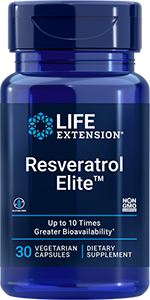- Science & Research
- Science News
- Newsletter
- 2007
- October 12

Newsletter
Newsletter
Red wine resveratrol protect against food borne illness
 | ||||||||||||||||||||||||||||||
| ||||||||||||||||||||||||||||||
| ||||||||||||||||||||||||||||||
| Life Extension Update Exclusive Red wine, resveratrol protect against food-borne illness Research presented recently at the Institute of Food Technologists’ annual conference held in Chicago has uncovered yet another benefit for red wine and resveratrol: that of protecting humans from food-borne illnesses. Azlin Mustapha, who is an associate professor of food science in the College of Agriculture, Food and Natural Resources at the University of Missouri-Columbia, and food science program doctoral student Atreyee Das are investigating the effects of grape juice and various red wines on harmful as well as helpful bacteria in the intestinal tract. Commonly used antibiotics can destroy the body’s beneficial bacteria, which help combat elevated cholesterol and even tumors, among other positive effects. The duo discovered that red wines, particularly Cabernet, Pinot noir and Merlot, inhibit food borne pathogens including E. coli, Salmonella Typhimurium, Listeria monocytogenes, and Helicobacter pylori, without harming beneficial probiotic bacteria. The most promising results were those found for H. pylori, which is the bacterium that causes most stomach ulcers. Ethanol (the alcohol that occurs in wine), pH levels and resveratrol were separately found have similar effects. While grape juice was also effective, white wine was not. “It’s not just ethanol in the red wine that is inhibitory toward food-borne pathogens, but other factors which include the pH of the wine – because wines are a little acidic, and possibly the phytochemicals may have an effect,” Dr Mustapha observed. “We hypothesize that these phytochemicals, resveratrol being the main one, also play a role not just as antioxidants but also may have some inhibitions against food-borne pathogens. Now, we’re concentrating mainly on the resveratrol effects on these pathogens.” “Our study is a little different than those previously reported in the media. Those studies promote moderate red wine consumption for cardiovascular diseases,” Dr Mustapha noted. “We went a step farther and asked: If red wine is already good for cardiovascular diseases, what about food-borne pathogens? If you get a food-borne illness and drink red wine, will that help decrease the symptoms a little bit? This study showed that the four probiotics tested weren’t inhibited by red wines; the pathogens were.” Infectious diarrhea is a leading cause of morbidity and mortality worldwide (Marignani M et al 2004; Reinert P 1993). In the United States, 100 million people are affected by acute diarrhea every year. Most diarrhea is viral (not bacterial) in origin, but bacteria remain an important cause. Nearly half of patients with acute diarrhea must restrict activities, 10 percent consult physicians, 250,000 require hospitalization, and approximately 3000 die. Common bacterial pathogens that cause diarrhea include Campylobacter species, salmonella, shigella, and E. coli O157:H7. Probiotics are bacterial cultures contained in yogurt, buttermilk, cheese, kefir, and sauerkraut, or in dietary supplements that contain friendly bacteria (such as Lactobacillus, Bifidobacterium, Eubacterium, and Propionibacterium species) normally present on skin and in vaginal, urinary, and intestinal tracts. These bacteria are essential to the proper function of the vaginal, urinary, and digestive tracts (Bengmark S 1998; Cunningham-Rundles S et al 2000; Dani C et al 2002). Probiotics assist immune function by inhibiting harmful bacterial growth, promoting good digestion, maintaining proper pH, and enhancing immune function (Perdigon G et al 1995). Probiotics produce bacteria-inhibiting substances (natural antibiotics) and prevent harmful bacteria from attaching to vaginal, urinary, and intestinal tract mucosal linings (Ochmanski W et al 1999; Vaughan EE et al 1999). Probiotics have demonstrated In vitro ability to suppress H. pylori (Cremonini F et al 2001; Drouin E 1999; Felley C et al 2003; Johnson-Henry KC et al 2004; Wang KY et al 2004). Antibiotics often destroy friendly bacteria on skin and in urinary, vaginal, and intestinal tracts. Probiotics can be used to recolonize and restore natural floral balance in organ and body systems after antibiotic treatment (Fooks LJ et al 2002; Guarner F et al 2003; Shi HN et al 2004). Featured Products
Life Extension Vacations Spend a week in Cancún with your family and friends and enjoy spacious villa accommodation in a spectacular beachfront setting at Club Internacional de Cancún. This five-star resort is located a stone’s throw from shopping malls, golf courses, restaurants, bars and more. Your family will enjoy the services at Club Internacional de Cancún, which include two pools, tennis courts, an activity program for adults and children, sail boating, a restaurant, bar, convenience store, tour desk and car rental. Guests can also enjoy the facilities at the other Royal Resorts by hopping on the free inter-resort shuttle bus. Your fully equipped two-bedroom villa sleeps five and has a kitchen, a spacious living and dining area and a private terrace.
Save $50** on your airfare to Cancun when you book through Life Extension Vacations! Our representatives will also be glad to assist you with your transfers or car rental in Cancún. * Rate is per villa per week and includes all resort taxes. This special rate is based on type B villas (accommodates five). Type C units are not included in this promotion (accommodation for six). Promotion is subject to availability. Phone: 1-800-791-4457 | ||||||||||||||||||||||||||||||
| If you have questions or comments concerning this issue or past issues of Life Extension Update, send them to ddye@lifeextension.com or call 1-800-678-8989. For longer life,  Dayna Dye
Sign up for Life Extension Update at News Subscription Help spread the good news about living longer and healthier. Forward this email to a friend! View previous issues of Life Extension Update in the Newsletter Archive. | ||||||||||||||||||||||||||||||
The latest news on aging, nutrition, and vitamins
Lab
Testing
How Life Extension lab testing works

